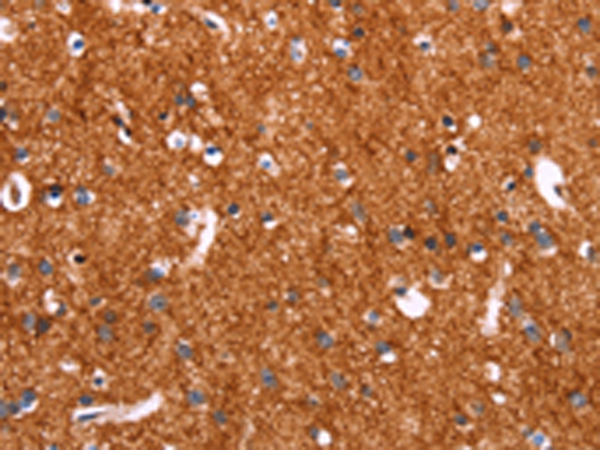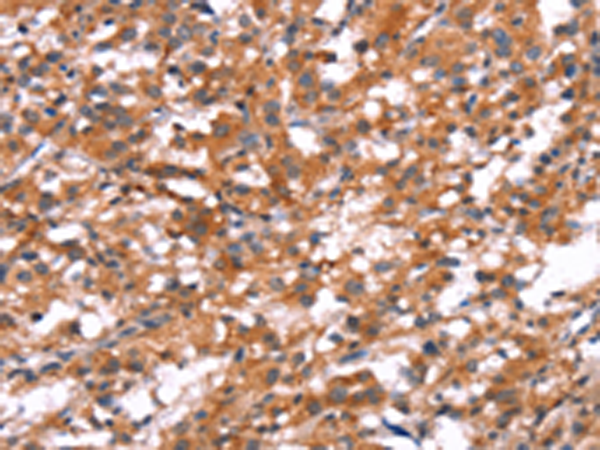


| WB | 1/1000 | Human,Mouse,Rat |
| IF | 咨询技术 | Human,Mouse,Rat |
| IHC | 1/100-1/500 | Human,Mouse,Rat |
| ICC | 技术咨询 | Human,Mouse,Rat |
| FCM | 咨询技术 | Human,Mouse,Rat |
| Elisa | 咨询技术 | Human,Mouse,Rat |
| Aliases | GAT1; GABATR; GABATHG |
| WB Predicted band size | 67 kDa |
| Host/Isotype | Rabbit IgG |
| Antibody Type | Primary antibody |
| Storage | Store at 4°C short term. Aliquot and store at -20°C long term. Avoid freeze/thaw cycles. |
| Species Reactivity | Human, Mouse, Rat |
| Immunogen | Synthetic peptide of human SLC6A1 |
| Formulation | Purified antibody in PBS with 0.05% sodium azide and 50% glycerol. |
+ +
以下是基于假设的示例格式(INSC抗体相关研究较少,请核实名称准确性):
1. **"INSC Antibody Characterization in Neural Stem Cell Differentiation"**
- 作者:Smith A et al. (2020)
- 摘要:研究INSC抗体在神经干细胞分化中的标记作用,验证其特异性并探讨在神经发育中的潜在功能。
2. **"Role of INSC in Pancreatic β-Cell Function: Antibody-Based Analysis"**
- 作者:Lee J et al. (2018)
- 摘要:通过INSC抗体的免疫组化分析,揭示该蛋白在胰岛素分泌调控中的作用,关联糖尿病模型中的表达变化。
3. **"Development of a Novel Monoclonal INSC Antibody for Cancer Biomarker Detection"**
- 作者:Chen R et al. (2021)
- 摘要:报道一种高特异性INSC单克隆抗体的制备,用于肿瘤组织检测,验证其在结直肠癌中的诊断价值。
注:以上为模拟文献,实际研究中“INSC”可能需结合具体领域确认(如胰岛素相关或基因命名)。建议通过PubMed/Google Scholar以“INSC antibody” + 研究领域关键词检索最新文献。
INSC antibodies target the Inscuteable (INSC) protein, a critical regulator of cell polarity and asymmetric cell division during development. First identified in *Drosophila*, INSC orchestrates the orientation of mitotic spindles and the partitioning of cell fate determinants in neural progenitor cells, ensuring proper differentiation and tissue patterning. Its homologs in mammals, including humans, play conserved roles in neurogenesis, epithelial morphogenesis, and stem cell maintenance.
INSC antibodies are essential tools for studying these processes. They enable visualization of INSC localization via immunofluorescence, quantify protein expression through Western blotting, and assess functional interactions in co-immunoprecipitation assays. Researchers employ these antibodies to investigate developmental defects, cancer (where disrupted polarity contributes to tumorigenesis), and neurodevelopmental disorders.
The generation of INSC antibodies often involves immunizing hosts with peptide sequences unique to INSC isoforms to ensure specificity. Validation includes knockout cell controls and tissue staining patterns consistent with known expression profiles. Asymmetric division studies, particularly in neural stem cells and model organisms like *Drosophila*, heavily rely on these antibodies to dissect molecular mechanisms underlying cell fate decisions. Their utility spans basic developmental biology and translational research, linking cell polarity pathways to disease mechanisms.
×